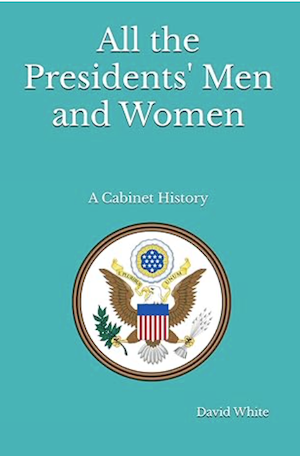U.S.
President

The
United States Government Executive Branch is headed by the
President. Learn more about the office through the links
below.
How
a Bill Becomes a Law
Follow a bill, from its introduction to Congress to its
signing by the President. Find out about all the steps in
between, including the presidential veto and the
Congressional override. This article is good for people of
all ages!
GET THIS GREAT NEW BOOK

It's a detailed rundown of ALL of the Cabinet members of EVERY president. Trace the history of America in a novel new way.
|
The Presidential Veto
The President of the United States has extraordinary power over the shaping of federal laws: He or she can veto any law passed by Congress.
How the President Is Elected
Good step-by-step examination of the electoral process, from campaigns to the election
Presidential Executive Orders
A contentious issue in recent years has been the President's power to issue executive orders, which take the form of law but aren’t generated by Congress. The Constitution nowhere says explicitly, “The President can issue executive orders.” So an executive order is a pronouncement by the President that has the force of law but isn’t something that came to the President’s desk from Congress.
The History of the Presidential Election
EVERY election, from George Washington to the present. Which political parties have come and gone? Who has been elected more times than anybody else? Who were the "Know-Nothings"? All these and more are answered in this expansive yet easy-to-read article.
Women Candidates for President of the United States
Hillary Clinton, in 2016, became the first female presidential nominee of one of America's two major political parties. She was not, however, the first woman to run for President of the United States.
Presidential Inauguration
American Presidents officially take office on January 20 of the year after they are elected.
Presidential Inaugural Addresses
Some of what historians consider the best inaugural addresses have come during trying times in the nation's history.
The President's First 100 Days
The idea of the President's first 100 days in office being a measure of success dates to 1933.
The 2016 Presidential Election
Recaps the election campaign and ends with the Electoral College total
The 2012 Presidential Election
Recaps the election campaign and ends with the Electoral College total
The 2008 Presidential Election
Follows the election from its beginnings (primaries and caucuses) through the conventions and to the general election day
The Electoral College
What really happens? How does it work? This article takes the mystery out of the electoral tradition.
The Specifics of the Electoral College
What actually happens on Election Day is that voters cast their ballots for a bunch of electors, not technically the presidential candidates whose names are on the ballot. These electors make up the Electoral College. Each individual state and the District of Columbia will have one list of electors for each presidential candidate. The Democratic Party will have its set of electors, the Republican Party will have its set of electors, etc. The state will then assign the electors who will attend the Electoral College based on which presidential candidate wins the popular vote in that state.
The 'Faithless Electors' of the Electoral Process
Article II of the Constitution lists the specifics of the Electoral College. Each state sends a number of electors to that state's capital, for a special meeting that, technically, elects the President; however, the requirements of those electors as to how to proceed at that meeting varies by state.
U.S.
Presidents in History
Learn more about the presidents in U.S. history.
Official
Site of the Presidency
This is it, the official website of the Oval Office.
Historical Inaugurations
Great infographic tracing presidential inauguration details, including quotes, costs, and economics
WhiteHouseKids
The president's official site for kids. Take a quiz, check
out the Dream Team, and more.
The
White House
Find out more about the building itself.
The
Executive Branch
More information on the Cabinet and other parts of the
Executive Branch.



